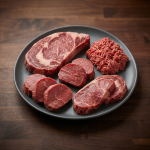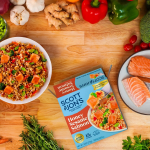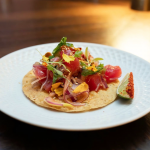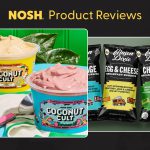NOSH Live Day One Recap: The Importance of Scrappiness and Storytelling

Natural food leaders converged today in Santa Monica during day one of NOSH Live Winter 2021 to discuss the state of the industry after an evolutionary year of changing trends and consumer shopping habits.
The State of the Market: Looking Back on the Past Year
Erewhon chief growth officer Kabir Jain, CAULIPOWER founder and CEO Gail Becker, Country Archer Provisions co-founder and CEO Eugene Kang and Loft Growth Partners partner Liz Myslik kicked off the day with a wide-ranging discussion on how retailers, investors and entrepreneurs have been impacted by a challenging market environment over the past year.
Supply chain disruption has continued to weigh on companies large and small, and because of it, this has been a “really challenging year,” Becker said. Despite brands’ best efforts to establish solid products and marketing plans, these supply chain issues have put a “tremendous strain” on industry members. These challenges have created a “ripple effect” across not only brands, but also retailers due to shortages and out-of-stock issues. According to Myslik, brands are now more focused than ever on supply, which ultimately presents an opportunity to establish a stronger supply chain that will make brands better overall.
Trying to maintain stability within this volatile market is no easy feat, Kang admitted, but the ability to control your business’ “controllables” is key. This includes building strong lines of communication with retailers and other partners across the supply chain and having honest and transparent conversations, which Kang described as “eye-opening” for Country Archer.
“There’s an inherent fear for emerging brands to go to retailers and talk about raising prices,” Kang said. “I encourage brands to have that open dialogue with their retail partners, [because] they’re open.”
Establishing an omnichannel presence is essential for brands and retailers going forward. As consumers migrated to D2C shopping during the pandemic, brands and retailers were forced to evolve to meet their needs. As consumers have returned to stores, retailers are adapting to the types of products consumers want and how they want to buy them, Myslik said.
Jain added that the onset of the pandemic was a “wake-up call” for Erewon as it balances its business around not only in-store grocery sales, but also sales via third-party delivery services Postmates, Doordash and Instacart. The company is also establishing its own online platform.
As retailers adjust to this in-store, delivery and digital balance, brands should seize the opportunities to get in front of consumers in new ways. Still, Jain said “getting into retail is half the battle” and the brands that will succeed within retail will work hard to market themselves well beyond the shelf.
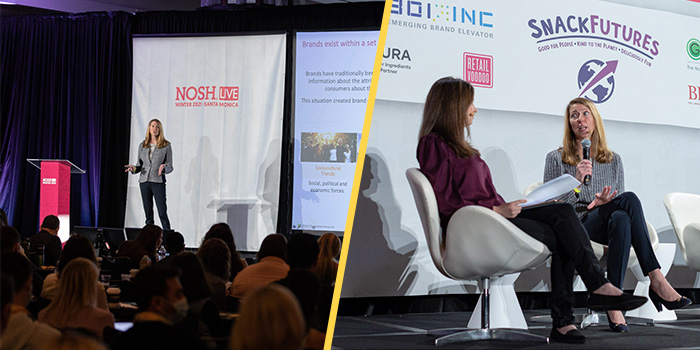
Hartman Group: How Brand, Product and Story Make You Magnetic
The Hartman Group CEO Laurie Demerritt examined how food companies can use brand attributes and mission to establish loyal consumer bases as many macro and micro cultural forces are interplaying and affecting consumer choices.
Amid changing sociocultural trends, values, consumer needs, behaviors and habits, the role of brands has evolved. Consumers are shifting from brand loyalty to a more product-focused shopping approach in which they evaluate ingredients and on-pack callouts first and foremost. Consumers have become more attribute-oriented, and millennials are now almost twice as likely to buy a product that is marketed as sustainable. As a result of these changing shopping behaviors, the perception of private label brands is evolving, with consumers viewing those brands as high-quality choices, especially for premium tier offerings.
Those who have clear communication on packaging and across their marketing regarding ingredients, production processes, sourcing and certifications will be the most successful, Demerritt said.
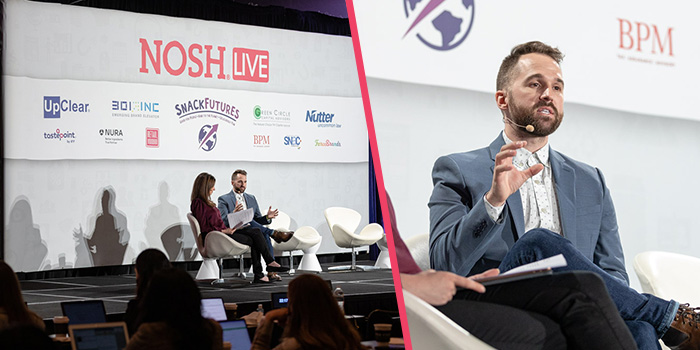
Rejuvenating Center Store at Earth Fare
Earth Fare’s 2020 was fairly notable, after announcing it would close due to financial challenges before ultimately reopening later in the year.
At this time, Gavin Konkel, VP of center store merchandising at Earth Fare, said the natural retailer decided to take what was working the best within the store, adopting an entrepreneurial spirit to maximize opportunities. Earth Fare took this new opportunity to establish a new vision and strategy around its “food philosophy,” enhancing its merchandising standard and evaluating overexposed categories — diving deeper into functional foods and pulling back in segments such as yogurt.
As Earth Fare evolves, Konkel said brands looking to land on its shelves or any other grocery shelves need to see if their product is a fit by getting to know a retailer, which will ultimately help them sell to buyers. Konkel noted that “getting in is easier than staying in” so establishing strong relationships with buyers is essential.
Other notable session takeaways:
- Miyoko’s founder and CEO Miyoko Schinner and Tofurky president Jaime Athos, NOSH’s 2021 Person of the Year award winners, discussed their push to support the voices of plant-based brands by fighting legislation that limits them using terms like “meat” and “cheese” on their packaging. With these efforts, the two companies hope to pave the way for smaller, emerging brands in the plant-based space, while also raising awareness about the benefits of plant-based proteins as compared to animal agriculture.
- Lily’s Sweets founder Cynthia Tice, former Lily’s CEO Jane Miller, and VMG general partner Wayne Wu, took a look at the early days of Lily’s and the business plan and “scrappiness” that led to the company’s success as the brand found its place within the whitespace of low-sugar confections. Then, Miller was joined by Hershey chief development officer Kris Meulen, Houlihan Lokey managing director Jay Novak and vice president Brandon Ng to discuss one of the year’s most notable deals: Hershey’s acquisition of Lily’s. According to Meulen, Lily’s will bring in incremental consumers for Hershey’s, and allow it to offer consumers a “holistic spectrum” of low-sugar products across several aisles of the store.
- The direct-to-consumer channel was paramount to brands’ success at the height of the pandemic, and a group of D2C masters Nick Ajluni and Nick Guillen, co-founders of Truff; Sashee Chandran, founder and CEO of Tea Drops; and Matt Jung, CEO of Last Crumb, touched on the strategies that helped them build their digital powerhouses. Having a clear voice and knowing how to position yourself within the channel is key, Jung noted, while Chandran said storytelling and keeping your audience engaged through strong content across not only D2C platforms but on social media helps it gain and retain customers.


